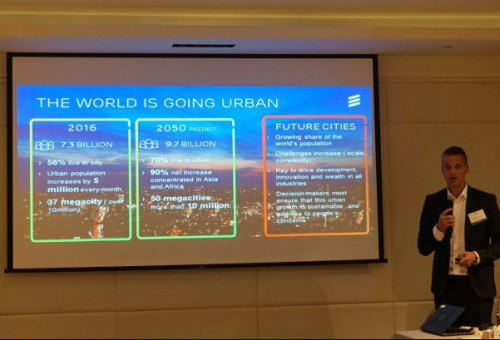Going beyond smart cities

The importance of broadband is not always fully appreciated. The United States' National Broadband Plan envisions that broadband can advance consumer welfare, civic participation, public safety and homeland security, community development, health care delivery, energy independence and efficiency, education, employee training, private sector investment, entrepreneurial activity, job creation and economic growth. According to estimates cited by Cervell, for every 1,000 broadband users, 80 jobs are created while for every 10% increase in broadband penetration, GDP increases by 1%. Bringing broadband to the masses is also one of the United Nation's 2030 sustainable development goals.
Urbanisation continues to increase. Already 56% of the world's population lives in cities and this percentage is expected to rise to 70% by 2050 (equivalent to seven billion people living in cities).
A key motivation behind Ericsson's Networked Society City Index is to enhance awareness of and promote the key role that cities can play in realizing the vision of a Networked Society. Cities will be critical for the advancement of sustainable economic growth, social conditions, poverty reduction, better health and education as well as improved inclusion. Equally, what happens in cities will have a heavy impact on progress towards encouraging economic inclusion and the development towards more sustainable consumption as well as to combat climate change.
The 2016 Networked Society City Index ranks 41 cities around the world based on two perspectives: performance in triple bottom line (TBL), with particular regards to sustainable urban development, and ICT maturity. 2016 is the fifth consecutive year the report has been produced.
Stockholm was the top-ranked city, followed by London, Copenhagen, Singapore and Paris. Taipei ranked 11th, up from 13th place in 2014. Looking at the top-ranked countries, it is clear that there is a positive correlation between social and economic development and increasing ICT maturity.
Today, many smart city initiatives have been mainly used to optimize existing systems and behaviours. However, cities are still far from being sustainable. Most cities fail to meet globally-recognized limits for climate change, air pollution and fossil-free energy consumption.
Cervell noted that while there was not yet concrete evidence of the hypothesis, he believes that ICT is not only critical to socio-economic progress, but can help decouple this progress from an increased environmental footprint in favour of a greater degree of sustainable development. He cited the ability to utilize traffic flow data and driverless vehicles as examples of how technology can be used to reduce congestion and improve traffic efficiency, thereby cutting carbon emissions. Another example is smart grids, which use ICT to optimize the use of electricity based on real-time demand. Having the right ICT infrastructure in place is a prerequisite for realizing these kinds of efficiencies.
Ericsson has undertaken research to try to understand citizens better through its "Consumerlab". This research has identified traffic volume maps, daily energy usage comparison and water quality checkers as smart concepts most wanted by consumers.
While some cities are launching smart city pilot projects, the impact will be limited unless there is greater collaboration, linkage between projects, digitalization, automation and analysis and effective use of big data. He concluded that many smart city initiatives are used to optimize existing systems, but city authorities need to rethink existing structures to fully grasp the potential of ICT, and make sure "smart" is also sustainable.
